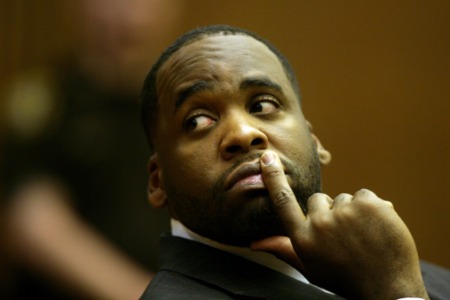
On the 20th day of the federal corruption trial involving former Detroit Mayor Kwame Kilpatrick, his father Bernard Kilpatrick, contractor Bobby Ferguson, and former water Department head Victor Mercado, tedious testimony continued.
One new witness testified Wednesday morning as well as a returning witness from last week.
This week marked the first that prosecution attorneys worked carefully to set the foundation for evidence submitted to prove the defendants were involved in a complex bid rigging scheme. Wednesday was also one of the few times since the trial started three weeks ago that Mercado’s name, and racially charged language up in testimony.
The first witness the United States called forth Wednesday was Pratap Rajadhyaksha, former chief operating officer of the minority-owned engineering firm DLZ.
The Detroit Water and Sewer Department (DWSD) hired DLZ starting in 2003 to replace old water mains in the city as part of a pilot program. After the trail run in 2003, the DWSD started another larger water main replacement projects in the downtown area ahead of the 2005 Super Bowl.
Rajadhyaksha testified that Mercado told him to hire Ferguson’s construction firm Ferguson Enterprises as one of the subcontractors to do the multi-million dollar projects.
After working with Ferguson throughout the pilot program, Rajadhyaksha said his work was Ok, but that Ferguson was not the best subcontractor of the three minority-owned companies that were hired for the job.
“He was the most difficult contractor to deal with. He was continually late but we hung tough and everything got done.” Rajadhyaksha told the jury. “We [DLZ management] spent 50 percent of our time working with Ferguson’s teams and 50 percent of our time working with all the others,” Rajadahyaksha said.
At one point Rajadhyaksha said he wrote a letter to Mercado, asking him to remove Ferguson as a contractor on the pilot project. Mercado told Rajadahyaksha to keep working with Ferguson.
After Rajadhyaksha sent the letter to Mercado, Ferguson confronted him. “He was very upset,” Rajadahyaksha said.
“He said ‘Don’t worry about the director (Mercado) worry about me.”
Rajadhyaksha said he took that to mean that Ferguson had connections above Mercado in the Mayor’s office.
Ferguson’s attorney Mike Rataj objected to prosecutors asking Rajadhyaksha his interpretation of Ferguson’s statement, which Judge Nancy Edmunds overruled.
Although Rajadhyaksha acknowledged that it was a tough job where subcontractors and DLZ engineers worked late into nights and often through weekends, Rajadahyaksha said that Ferguson asked for more change orders—more money for what he said were unforeseen expenses—than any of the other contractors.
Rajadhyaksha said he was surprised when the pilot construction tuned into a full-blown contract. Mercado insisted DLZ hire Ferguson Enterprises again to work on the water mains downtown.
“I thought this was unusual,” Rajadhyaksha said. “In casual conversations with Mr. Mercado he said he was under pressure to give Mr. Ferguson work and that he was getting tired of it.”
Much of Rajadhyaksha’s testimony, which lasted three hours, outlined what seemed to be common business squabbles and interactions.
In cross examination, Ferguson’s attorney Mike Rataj worked to discredit the former DLZ contractor as a credible witness, pointing out that Rajadhyaksha did not have a clean slate, that he was in fact fired from DLZ by his own brother and suggested the Rajadhyaksha himself was involved in unethical meetings with city officials in order to get privileged information about upcoming contracts.
Rataj asked Rajadhyaksha if he told EPA Special Agent Carol Paszkiewicz, one of the federal investigators in the corruption case about the firing.
Rajadhyaksha said he hadn’t.
The second witness the prosecution called on Wednesday was EPA Special Agent Carol Paszkiewicz, who testified about out evidence collected through archived text messages between Kilpatrick and Ferguson in 2003 and 2004 suggesting that the two conspired to make sure Ferguson’s construction firm got multi-million dollars water main replacement contracts.
Paszkiewicz blushed at times when she had to read each text out loud, often in Ebonics slang and cluttered with profanity and racially charged language.
Ferguson: “Just left Victor. The date has been changed to my benefit. But we still have problem on the big one, [Mercado] thinks he is slickman with these white folks.”
According to Paszkiewicz’s collection of texts, Kilpatrick responded: “His slick sh—t is running out. I got his ass on something. I ain’t happy.”
Days later, on March 23, 2004, Ferguson sent the mayor another text, worried that the water main project was going to be awarded to white firms.
“Victor just outsmarted us, he just had me come to his office. I thought it was about the job we have, it was about the three lowest bidders, white folks,” Ferguson allegedly wrote in a text.
In July 2004, Ferguson received the multi-million dollar DWSD contract to replace water mains downtown instead of the lowest bidding white-owned contractors.
Defense lawyers say the move is an act of affirmative action although there was one minority-owned firm with a bid lower than Ferguson’s. It is estimated that Ferguson’s company earned more than $16 million from water main contracts.
Prosecutors say the defendant’s scheme cost the city millions in costly contracts.
The four defendants, Kwame and Bernard Kilpatrick, Mercado, and Ferguson, after charged with using city hall as a racket for personal gain, conspiracy, and extortion among other charges.